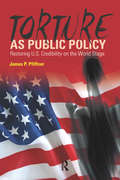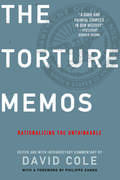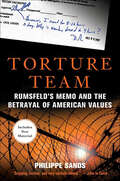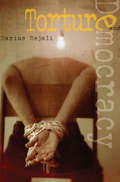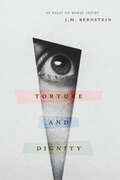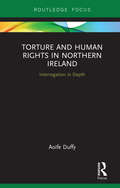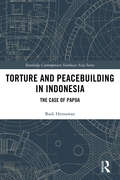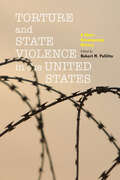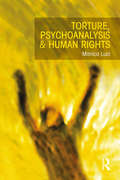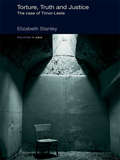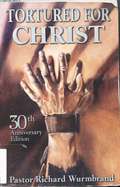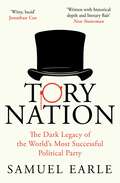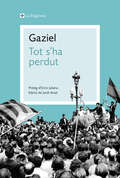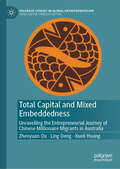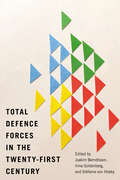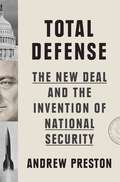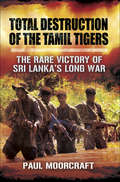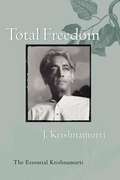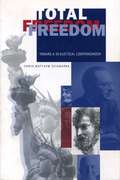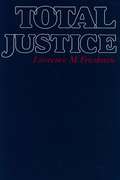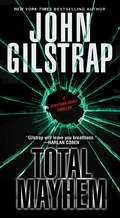- Table View
- List View
Torture As Public Policy: Restoring U.S. Credibility on the World Stage
by James P. PfiffnerAfter September 11, 2001 the Bush Administration decided that the most important intelligence about terrorism would come from the interrogation of captives suspected of terrorism. As a result, many detainees were subject to harsh interrogation techniques that at times amounted to torture. Here, James P. Pfiffner authoritatively examines the policy directives, operational decisions, and leadership actions of the Bush Administration that reversed centuries of US policy on the treatment of enemy prisoners. He shows how the serious reservations of career military lawyers about these policies were overcome by the political appointees of the Bush Administration. Pfiffner then analyses the philosophical and legal underpinnings of the policies and practices that have led to the denunciation of the United States' policies by its allies and adversaries throughout the world. Looking ahead, Pfiffner anticipates Obama administration policy changes to restore U.S. credibility and accountability. In all, Torture as Public Policy is a model of detailed policy analysis that demonstrates how greatly public policy matters beyond the back corridors of bureaucracy.
Torture Memos
by David ColeOn April 16, 2009, the Justice Department released never-before-seen secret memos describing, in graphic detail, the brutal interrogation techniques used by the CIA under the Bush administration's "war on terror." Now, for the first time, the key documents are compiled in one remarkable volume, showing that the United States government's top attorneys were instrumental in rationalizing acts of torture and cruelty, employing chillingly twisted logic and Orwellian reasoning to authorize what the law absolutely forbids.This collection gives readers an unfiltered look at the tactics approved for use in the CIA's secret overseas prisons--including forcing detainees to stay awake for eleven days straight, slamming them against walls, stripping them naked, locking them in a small box with insects to manipulate their fears, and, of course, waterboarding--and at the incredible arguments advanced to give them a green light. Originally issued in secret by the Office of Legal Counsel between 2002 and 2005, the documents collected here have been edited only to eliminate repetition. They reflect, in their own words, the analysis that guided the legal architects of the Bush administration's interrogation policies.Renowned legal scholar David Cole's introductory essay tells the story behind the memos, and presents a compelling case that instead of demanding that the CIA conform its conduct to the law, the nation's top lawyers contorted the law to conform to the CIA's abusive and patently illegal conduct. He argues eloquently that official accountability for these legal wrongs is essential if the United States is to restore fidelity to the rule of law.
Torture Team: Rumsfeld's Memo and the Betrayal of American Values
by Philippe SandsThe shocking revelations of the men and women who adopted and enforced Rumsfeld's 2002 memo that paved the way for the inhuman interrogation practices at Guantanamo and Abu Ghraib.On December 2, 2002 the U.S. Secretary of Defense, Donald Rumsfeld, signed his name at the bottom of a document that listed eighteen techniques of interrogation--techniques that defied international definitions of torture. The Rumsfeld Memo authorized the controversial interrogation practices that later migrated to Guantanamo, Afghanistan, Abu Ghraib and elsewhere, as part of the policy of extraordinary rendition. From a behind-the-scenes vantage point, Phillipe Sands investigates how the Rumsfeld Memo set the stage for a divergence from the Geneva Convention and the Torture Convention and holds the individual gatekeepers in the Bush administration accountable for their failure to safeguard international law. The Torture Team delves deep into the Bush administration to reveal:- How the policy of abuse originated with Donald Rumsfeld, Dick Cheney and George W. Bush, and was promoted by their most senior lawyers- Personal accounts, through interview, of those most closely involved in the decisions- How the Joint Chiefs and normal military decision-making processes were circumvented- How Fox TV's 24 contributed to torture planning- How interrogation techniques were approved for use - How the new techniques were used on Mohammed Al Qahtani, alleged to be "the 20th highjacker" - How the senior lawyers who crafted the policy of abuse exposed themselves to the risk of war crimes charges
Torture and Democracy
by Darius RejaliThis is the most comprehensive, and most comprehensively chilling, study of modern torture yet written. Darius Rejali, one of the world's leading experts on torture, takes the reader from the late nineteenth century to the aftermath of Abu Ghraib, from slavery and the electric chair to electrotorture in American inner cities, and from French and British colonial prison cells and the Spanish-American War to the fields of Vietnam, the wars of the Middle East, and the new democracies of Latin America and Europe. As Rejali traces the development and application of one torture technique after another in these settings, he reaches startling conclusions. As the twentieth century progressed, he argues, democracies not only tortured, but set the international pace for torture. Dictatorships may have tortured more, and more indiscriminately, but the United States, Britain, and France pioneered and exported techniques that have become the lingua franca of modern torture: methods that leave no marks. Under the watchful eyes of reporters and human rights activists, low-level authorities in the world's oldest democracies were the first to learn that to scar a victim was to advertise iniquity and invite scandal. Long before the CIA even existed, police and soldiers turned instead to "clean" techniques, such as torture by electricity, ice, water, noise, drugs, and stress positions. As democracy and human rights spread after World War II, so too did these methods. Rejali makes this troubling case in fluid, arresting prose and on the basis of unprecedented research--conducted in multiple languages and on several continents--begun years before most of us had ever heard of Osama bin Laden or Abu Ghraib. The author of a major study of Iranian torture, Rejali also tackles the controversial question of whether torture really works, answering the new apologists for torture point by point. A brave and disturbing book, this is the benchmark against which all future studies of modern torture will be measured.
Torture and Dignity: An Essay on Moral Injury
by J. M. BernsteinIn this unflinching look at the experience of suffering and one of its greatest manifestations--torture--J. M. Bernstein critiques the repressions of traditional moral theory, showing that our morals are not immutable ideals but fragile constructions that depend on our experience of suffering itself. Morals, Bernstein argues, not only guide our conduct but also express the depth of mutual dependence that we share as vulnerable and injurable individuals. Beginning with the attempts to abolish torture in the eighteenth century, and then sensitively examining what is suffered in torture and related transgressions, such as rape, Bernstein elaborates a powerful new conception of moral injury. Crucially, he shows, moral injury always involves an injury to the status of an individual as a person--it is a violent assault against his or her dignity. Elaborating on this critical element of moral injury, he demonstrates that the mutual recognitions of trust form the invisible substance of our moral lives, that dignity is a fragile social possession, and that the perspective of ourselves as potential victims is an ineliminable feature of everyday moral experience.
Torture and Human Rights in Northern Ireland: Interrogation in Depth
by Aoife DuffyThis book presents a compelling and highly sophisticated politico-legal history of a particular security operation that resulted in one of the most high-profile torture cases in the world. It reveals the extent to which the Ireland v. United Kingdom judgment misrepresents the interrogation system that was developed and utilised in Northern Ireland. Finally, the truth about the operation is presented in a comprehensive narrative, sometimes corroborating secondary literature already in the public domain, but at other times significantly debunking aphorisms, or, indeed, lies that circulated about interrogation in depth. The book sets out the theoretical reference paradigm with respect to the culture and practice of state denial often associated with torture, and uses this model to excavate the buried aspects of this most famous of torture cases. Through the lens of a single operation, conducted twice, it presents a fascinating exposé of the complicated structures of state-sponsored denial designed to hide the truth about the long-term effects of these techniques and the way in which they were authorised.
Torture and Peacebuilding in Indonesia: The Case of Papua (Routledge Contemporary Southeast Asia Series)
by Budi HernawanState-sponsored torture and peacebuilding encapsulate the essence of many of the current conflicts in Indonesia. Papua in particular provides a thought-provoking example of the intricacy and complexity of building peace amidst enduring conflict and violence. This book examines the complex power relations that have constructed the gruesome picture of the fifty-year practice of torture in Papua, as well as the ongoing Papuan peacebuilding movements that resist the domineering power of the Indonesian state over Papuans. Conceptualising ‘theatres of torture and peace’, the book argues that torture in Papua is performed in public by the Indonesian state in order to communicate its policy of terror towards Papuans - it is not meant for extracting information, gaining confessions or exacting punishment. A Torture Dataset is provided, codifying evidence from a broad range of cases, collected through sensitive interviews. In examining the data, the author crafts a new, more holistic framework for analyzing cases of torture and employs an interdisciplinary approach integrating three different theories: Foucault’s theory of governmentality and sovereignty, Kristeva’s theory of abjection and Metz’s theory of memoria passionis (the memory of suffering). The book successfully establishes a new understanding of torture as ‘public theatre’ and offers a new perspective of strengthening the existing Papuan peacebuilding framework of Papua Land of Peace. It will be of interest to academics working on Southeast Asian Studies, Peace and Conflict Studies, Transitional Justice, Peacebuilding, Human Rights and Anthropology of Violence.
Torture and State Violence in the United States: A Short Documentary History
by Robert M. PallittoThe war on terror has brought to light troubling actions by the United States government which many claim amount to torture. But as this book shows, state-sanctioned violence and degrading, cruel, and unusual punishments have a long and contentious history in the nation. Organized around five broad thematic periods in American history—colonial America and the early republic; slavery and the frontier; imperialism, Jim Crow, and World Wars I and II; the Cold War, Vietnam, and police torture; and the war on terror—this annotated documentary history traces the low and high points of official attitudes toward state violence. Robert M. Pallitto provides a critical introduction, historical context, and brief commentary and then lets the documents speak for themselves. The result is a nearly 400-year history that traces the continuities and changes in debates over the meaning of torture and state violence in the U.S. and shows where state actions and policies have pushed and exceeded constitutional and international normative limits. Rigorously researched—and sometimes chilling—this volume is the first comprehensive reference work on state violence and torture in the U.S.
Torture in the National Security Imagination
by Stephanie AtheyReassessing the role of torture in the context of police violence, mass incarceration, and racial capitalism At the midpoint of a century of imperial expansion, marked on one end by the Philippine–American War of 1899–1902 and on the other by post–9/11 debates over waterboarding, the United States embraced a vision of &“national security torture,&” one contrived to cut ties with domestic torture and mass racial terror and to promote torture instead as a minimalist interrogation tool. Torture in the National Security Imagination argues that dispelling this vision requires a new set of questions about the everyday work that torture does for U.S. society. Stephanie Athey describes the role of torture in the proliferation of a U.S. national security stance and imagination: as U.S. domestic tortures were refined in the Philippines at the turn of the twentieth century, then in mid-century counterinsurgency theory and the networks that brought it home in the form of law-and-order policing and mass incarceration. Drawing on examples from news to military reports, legal writing, and activist media, Athey shows that torture must be seen as a colonial legacy with a corporate future, highlighting the centrality of torture to the American empire—including its role in colonial settlement, American Indian boarding schools, and police violence. She brings to the fore the spectators and commentators, the communal energy of violence, and the teams and target groups necessary to a mass undertaking (equipment suppliers, contractors, bureaucrats, university researchers, and profiteers) to demonstrate that, at base, torture is propelled by local social functions, conducted by networked professional collaborations, and publicly supported by a durable social imaginary.
Torture, Power, and Law
by David LubanThis volume brings together the most important writing on torture and the 'war on terror by one of the leading US voices in the torture debate. Philosopher and legal ethicist David Luban reflects on this contentious topic in a powerful sequence of essays including two new and previously unpublished pieces. He analyzes the trade-offs between security and human rights, as well as the connection between torture, humiliation, and human dignity, the fallacy of using ticking bomb scenarios in debates about torture, and the ethics of government lawyers. The book develops an illuminating and novel conception of torture as the use of pain and suffering to communicate absolute dominance over the victim. Factually stimulating and legally informed, this volume provides the clearest analysis to date of the torture debate. It brings the story up to date by discussing the Obama administration's failure to hold torturers accountable.
Torture, Psychoanalysis and Human Rights
by Monica LuciTorture, Psychoanalysis and Human Rights contributes to the development of that field of study called ‘psycho-social’ that is presently more and more committed to providing understanding of social phenomena, making use of the explicative perspective of psychoanalysis. The book seeks to develop a concise and integrated framework of understanding of torture as a socio-political phenomenon based on psychoanalytic thinking, through which different dimensions of the subject of study become more comprehensible. Monica Luci argues that torture performs a covert emotional function in society. In order to identify what this function might be, a profile of ‘torturous societies’ and the main psychological dynamics of social actors involved – torturers, victims, and bystanders – are drawn from literature. Accordingly, a wide-ranging description of the phenomenology of torture is provided, detecting an inclusive and recurring pattern of key elements. Relying on psychoanalytic concepts derived from different theoretical traditions, including British object relations theories, American relational psychoanalysis and analytical psychology, the study provides an advanced line of conceptual research, shaping a model, whose aim is tograsp the deep meaning of key intrapsychic, interpersonal and group dynamics involved in torture. Once a sufficiently coherent understanding has been reached, Luci proposes using it as a groundwork tool in the human rights field to re-think the best strategies of prevention and recovery from post-torture psychological and social suffering. The book initiates a dialogue between psychoanalysis and human rights, showing that the proposed psychoanalytic understanding is a viable conceptualisation for expanding thinking of crucial issues regarding torture, which might be relevant to human rights and legal doctrine, such as the responsibility of perpetrators, the reparation of victims and the question of ‘truth’. Torture, Psychoanalysis and Human Rights is the first book to build a psychoanalytic theory of torture from which psychological, social and legal reflections, as well as practical aspects of treatment, can be mutually derived and understood. It will appeal to psychoanalysts, psychoanalytic psychotherapists and Jungians, as well as scholars of politics, social work and justice, and human rights and postgraduate students studying across these fields.
Torture, Truth and Justice: The Case of Timor-Leste (Politics in Asia)
by Elizabeth StanleyThis book highlights how, and why, torture is such a compelling tool for states and other powerful actors. While torture has a short-term use value for perpetrators, it also creates a devastating legacy for victims, their families and communities. In exposing such repercussions, this book addresses the questions ‘What might torture victims need to move forward from their violation?’ and ‘How can official responses provide truth or justice for torture victims?’ Building on observations, documentary analysis and over seventy interviews with both torture victims and transitional justice workers this book explores how torture was used, suffered and resisted in Timor-Leste. The author investigates the extent to which transitional justice institutions have provided justice for torture victims; illustrating how truth commissions and international courts operate together and reflecting on their successes and weaknesses with reference to wider social, political and economic conditions. Stanley also details victims’ experiences of torture and highlights how they experience life in the newly built state of Timor-Leste Tracking the past, present and future of human rights, truth and justice for victims in Timor-Leste, Torture, Truth and Justice will be of interest to students, professionals and scholars of Asian studies, International Studies, Human Rights and Social Policy.
Tortured Logic: Why Some Americans Support the Use of Torture in Counterterrorism (Columbia Studies In Terrorism And Irregular Warfare Ser.)
by Joseph Young Erin M. KearnsExperts in the intelligence community say that torture is ineffective. Yet much of the public appears unconvinced: surveys show that nearly half of Americans think that torture can be acceptable for counterterrorism purposes. Why do people persist in supporting torture—and can they be persuaded to change their minds?In Tortured Logic, Erin M. Kearns and Joseph K. Young draw upon a novel series of group experiments to understand how and why the average citizen might come to support the use of torture techniques. They find evidence that when torture is depicted as effective in the media, people are more likely to approve of it. Their analysis weighs variables such as the ethnicity of the interrogator and the suspect; the salience of one’s own mortality; and framing by experts. Kearns and Young also examine who changes their opinions about torture and how, demonstrating that only some individuals have fixed views while others have more malleable beliefs. They argue that efforts to reduce support for torture should focus on convincing those with fluid views that torture is ineffective. The book features interviews with experienced interrogators and professionals working in the field to contextualize its findings. Bringing empirical rigor to a fraught topic, Tortured Logic has important implications for understanding public perceptions of counterterrorism strategy.
Tortured for Christ, 30th anniversary edition
by Richard WurmbrandThis 30th anniversary edition of "Tortured for Christ" is the original testimony of a pastor's fourteen-year imprisonment under a Romanian dictatorship. The author says he has written this book, with pen and tears, only three days shortly after his release from prison.
Tory Nation: How one party took over
by Samuel Earle&‘A witty, lucid investigation into one of the great political mysteries of our time: the enduring love felt by the British people for the party which regularly manages to persuade them, against all the evidence, that it has their best interests at heart&’ JONATHAN COE, author of Bournville _________________________________________________________________________________The story of the most successful political party in the world, and a nation made in its image. Since 2010, the Conservative Party has presided over countless corruption scandals, blundered its way through a pandemic and trapped Britain in a cycle of permanent dysfunction. This has coincided with four election wins in a row, each one with a larger share of the vote than the last. How? The strange dissonance between the Conservatives&’ destructive record in government and their record of victory – which has seen them suffer only seven major defeats in the last 150 years – is one of the defining riddles of British politics. Tory Nation sets out to solve this puzzle. With dazzling clarity and insight, Samuel Earle explores the roots of the current crisis and the real reasons for the Conservatives&’ success, from their ruling class origins in the eighteenth century and their disproportionate influence on the British press to their stranglehold over national identity. He also sheds light on the Conservatives&’ historic appeal among the working classes and why the Labour Party so often disappoints. Tory Nation describes the making of Britain through one party&’s astonishing staying power. It&’s only by reaching into our history, Earle argues, that we can understand how we got here – and how we can find a way out _________________________________________________________________________________'Finally, someone has explained why the British electorate behaves like Turkeys voting for Christmas. Sam Earle has set out clearly and eloquently why our democracy is incapable of solving our political problems' ROBERT VERKAIK, author of Posh Boys&‘Eviscerating. Less a political book and more a mystery novel . . . untangles the riddle of the strange cognitive dissonance between the Tories&’ bumbling, destructive political record and their inexplicable electoral success&’i-D
Tot s'ha perdut
by Agustí CalvetEl magnífic recull d'articles que GAZIEL va publicar a La Vanguardia entre els anys 1922 i 1934 on explicava, amb una gran visió crítica, una realitat política que sorprenentment és ben pastada a l'actual. «No busquemos, pues, ninguna explicación absurda a nuestro infortunio, ya que la única y principal es muy clara. Los culpables de cuanto le ocurre a Cataluña somos los catalanes. Los partidos que nos representaron, y nosotros que les indujimos a que lo hicieran tan mal. Y esto es todo. [...] Un día saldremos de este negro pozo en que caímos. Pero que, en adelante, nos sirva esta clara lección: solo podremos triunfar en España yendo todos los catalanes fuertemente unidos, como una irrompible falange, y además sólidamente abrazados con el mayor número posible de españoles hermanos». Aquestes paraules que Gaziel va escriure el 21 de desembre de 1934 a La Vanguardia encara ressonen avui.Pot ser quegairebé un segle després visquem amb la sensació ben viva que «tot s'ha perdut»? Com diu Jordi Amat a la nota a l'edició, «Gaziel va seleccionar intencionadament uns articles i no pas uns altres pel seu contingut, perquè volia traçar una crònica, la seva, d'uns anys capitals de la política catalana i del moviment catalanista». Us animem a recuperar-los i a llegir-los des de la distància dels anys amb la seguretat que bona part de les reflexions crítiques i lúcides d'Agustí Calvet ens donaran la clau per interpretar el nostre present i bastir-lo de nou. PRÒLEG D'ENRIC JULIANAEDICIÓ DE JORDI AMAT
Total Capital and Mixed Embeddedness: Unravelling the Entrepreneurial Journey of Chinese Millionaire Migrants in Australia (Palgrave Studies in Global Entrepreneurship)
by Xueli Huang Ling Deng Zhenyuan QuThis book focuses on the experiences of Chinese migrant entrepreneurs in Australia, exploring the challenges they face and the strategies they use to succeed in the business sector. Using interviews and in-depth case studies, and personal reflections, the book provides a rich narrative of personal and business experiences of these entrepreneurs. By exploring the real-life experiences of Chinese migrant entrepreneurs in Australia, the authors offer a deep dive into their daily lives and business operations and thereby providing detailed insights into their challenges and strategies. Whilst highlighting the main challenges such as cultural differences, language barriers, and difficulties in accessing resources, the book identifies the strategies Chinese migrant entrepreneurs use to overcome these challenges, including leveraging social networks and community support. Readers will find the discussion on how cultural differences affect business operations particularly interesting, as it provides a nuanced understanding of cross-cultural entrepreneurship. They would also be interested in the research into how Chinese business migrants contribute to Australia's innovation ecosystem through introducing new ideas and technologies, which is a key topic for understanding the broader economic impact of Chinese business migrants to Australia.
Total Defence Forces in the Twenty-First Century (Human Dimensions in Foreign Policy, Military Studies, and Security Studies #20)
by Stéfanie Von Hlatky Irina Goldenberg Joakim BerndtssonTotal defence, as a concept, combines and extends military and civil defence: in a state of war or emergency, all social institutions mobilize to defend the state. Total defence forces, led by a diverse workforce of defence and security professionals, are critical to both national defence and international security goals.Total Defence Forces in the Twenty-First Century looks at the various groups that make up this workforce: members of the military’s regular force, reservists, defence civil servants, and contractors working for private military and security companies. When civilian staff and military personnel work towards a common goal, their distinct professional cultures and identities can make integration challenging. Despite the often high levels of partnership, underlying differences affect the quality of the collaboration and, ultimately, organizational and operational effectiveness. Defence ministries around the world are increasingly recognizing the importance of optimizing the ways in which they employ and integrate civilian and military personnel.This volume focuses on a critical question: what are the main challenges to workforce integration and collaboration, and how can such challenges be overcome to deliver the full potential of the total defence force? Together, scholars and practitioners provide some answers.
Total Defense: The New Deal and the Invention of National Security
by Andrew PrestonThe story of how FDR and fellow New Dealers created the idea of national security, transforming the meaning of defense and vastly expanding the US government’s responsibilities.National security may seem like a timeless notion. States have always sought to fortify themselves, and the modern state derives its legitimacy from protecting its population. Yet national security in fact has a very particular, very American, history—and a surprising one at that.The concept of national security originates in the 1930s, as part of a White House campaign in response to the rise of fascism. Before then, national self-defense was defined in terms of protecting sovereign territory from invasion. But President Franklin D. Roosevelt and his circle worried that the US public, comforted by two vast oceans, did not take seriously the long-term risks posed by hypermilitarization abroad. New Dealers developed the doctrine of national security, Andrew Preston argues, to supplant the old idea of self-defense: now even geographically and temporally remote threats were to be understood as harms to be combated, while ideological competitors were perilous to the “American way of life.”Total Defense shows it was no coincidence that a liberal like Roosevelt promoted this vision. National security, no less than social security, was a New Deal promise: the state was obliged to safeguard Americans as much from the guns and warships of Nazi Germany and imperial Japan as from unemployment and poverty in old age. The resulting shift in threat perception—among policymakers and ordinary citizens alike—transformed the United States, spearheading massive government expansion and placing the country on a permanent war footing.
Total Destruction of the Tamil Tigers: The Rare Victory of Sri Lanka's Long War
by Paul MoorcraftIn 2009, the Sri Lankan government forces literally eradicated the Tamil Tiger insurgency after 26 years of civil war. This was the first time that a government had defeated an indigenous insurgency by force of arms. It was as if the British army killed thousands of IRA cadres to end the war in Northern Ireland. The story of this war is fascinating in itself, besides the international repercussions for terrorism and insurgency worldwide. Many countries involved themselves in the war to arm the combatants (China, Pakistan, India, and North Korea) or to bring peace (US, France, UK, and Norway).While researching this work Professor Moorcraft was given unprecedented access to Sri Lankan politicians (including the President and his brother, the Defense Permanent Secretary), senior generals, intelligence chiefs, civil servants, UN officials, foreign diplomats and NGOs. He also interviewed the surviving leader of the Tamil Tigers.His conclusions and findings will be controversial. He reveals how the authorities determined to stamp out Tamil Tiger resistance by whatever means frustrated the media and foreign mediators. Their methods, which have led to accusations of war crimes, were brutally effective but are likely to remain highly contentions for years to come.
Total Freedom: The Essential Krishnamurti
by J. Krishnamurti"[Krishnamurti's] language is naked, revelatory and inspiring. It pierces the clouds of philosophy which confound our thought and restores the springs of action. He initiated no new faith or dogma, questioned everything, cultivated doubt and perseverance, freed himself of illusion and enchantment of pride, vanity, and every subtle form of dominion over others... I know of no other living man whose thought is more inspiring."-HENRY MILLER Described by the Dalai Lama as "one of the greatest thinkers of the age," J. Krishnamurti has influenced millions throughout the twentieth century, and his thoughts continue to resonate even a decade after his death. His words have influenced such notables as Dr. Jonas Salk, Aldous Huxley, Joseph Campbell, Van Morrison, Bruce Lee, and countless other students of the spiritual path, ranging from scientists to philosophers to artists of all kinds. Practical, profound, and timeless, Krishnamurti's ideas- rejecting the prejudices of traditional learning, celebrating personal, spiritual freedom and the individual's search for Truth-are inspiring now more than ever. Collected in this comprehensive volume are the most illuminating and essential of his writings and talks: words that are of vital relevance to today's spiritual environment, and catalytic in guiding us toward a deeper understanding of ourselves, our place in the universe, and the mysteries of the human condition. "In my own life Krishnamurti influenced me profoundly and helped me personally break through the confines of my own self-imposed restrictions to my freedom." -DEEPAK CHOPRA, M.D. Total Freedom is both an introduction to Krishnamurti and an essential, extensive collection. It includes selections from his early work to his later Krishnamurti to Himself: His Last Journal, and his valuable insight into the nature of the self, meditation, sex, love, and the mysteries of life and death. Revealing his core teachings in all their eloquence and power, these writings incite us to recognize that "Truth is a pathless land," to accept no spiritual authority-not even himself- and to think critically, that we may free our minds and see clearly on our own personal journey. From the Book Jacket
Total Freedom: Toward a Dialectical Libertarianism
by Chris Matthew SciabarraBuilding upon his previous books about Marx, Hayek, and Rand, Total Freedom completes what Lingua Franca has called Sciabarra’s "epic scholarly quest" to reclaim dialectics, usually associated with the Marxian left, as a methodology that can revivify libertarian thought. Part One surveys the history of dialectics from the ancient Greeks through the Austrian school of economics. Part Two investigates in detail the work of Murray Rothbard as a leading modern libertarian, in whose thought Sciabarra finds both dialectical and nondialectical elements. Ultimately, Sciabarra aims for a dialectical-libertarian synthesis, highlighting the need (not sufficiently recognized in liberalism) to think of the "totality" of interconnections in a dynamic system as the way to ensure human freedom while avoiding "totalitarianism" (such as resulted from Marxism).
Total Institutions and Reinvented Identities
by Susie ScottWhy do people enter total institutions - places that confine and control them around the clock - and how does the experience change them? This book updates Goffman's classic model by introducing the Re-inventive Institution, where members voluntarily commit themselves to pursue regimes of self-improvement.
Total Justice
by Lawrence M. FriedmanIt is a widely held belief today that there are too many lawsuits, too many lawyers, too much law. As readers of this engaging and provocative essay will discover, the evidence for a "litigation explosion" is actually quite ambiguous. But the American legal profession has become extremely large, and it seems clear that the scope and reach of legal process have indeed increased greatly. How can we best understand these changes? Lawrence Friedman focuses on transformations in American legal culture—that is, people's beliefs and expectations with regard to law. In the early nineteenth century, people were accustomed to facing sudden disasters (disease, accidents, joblessness) without the protection of social and private insurance. The uncertainty of life and the unavailability of compensation for loss were mirrored in a culture of low legal expectations. Medical, technical, and social developments during our own century have created a very different set of expectations about life, again reflected in our legal culture. Friedman argues that we are moving toward a general expectation of total justice, of recompense for all injuries and losses that are not the victim's fault. And the expansion of legal rights and protections in turn creates fresh expectations, a cycle of demand and response. This timely and important book articulates clearly, and in nontechnical language, the recent changes that many have sensed in the American legal system but that few have discussed in so powerful and sensible a way. Total Justice is the third of five special volumes commissioned by the Russell Sage Foundation to mark its seventy-fifth anniversary.
Total Mayhem (A Jonathan Grave Thriller #11)
by John GilstrapIn bestselling author John Gilstrap’s ticking time bomb of a thriller, freelance operative Jonathan Grave penetrates a terrorist cell to stop the detonation of total mayhem on home ground . . . America is under fire. One by one, simultaneous terror attacks have left the country reeling. The perpetrators are former Special Forces operatives working for ISIS. Jonathan Grave and his team are called to go undercover and eliminate the traitors. No need to collect intel. No need for arrest. Wipe them out—and get out. The assaults are rehearsals for extreme disaster. A plot codenamed Retribution. One terrorist is willing to talk—for a price. Grave’s only resort is to slip into a dark web where everything can be exposed. Where the rules of engagement do not hold. The bombs have been set and Grave is the one being hunted. Unless he can save himself first, a terrorist plot of unimaginable scope will become history’s deadliest disaster . . .
